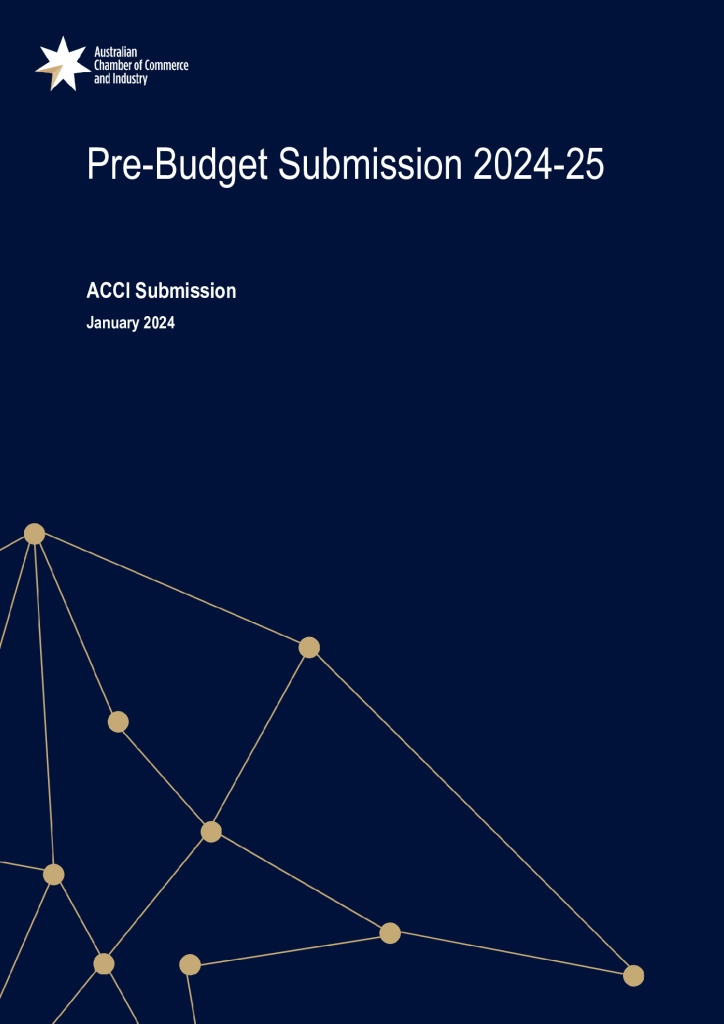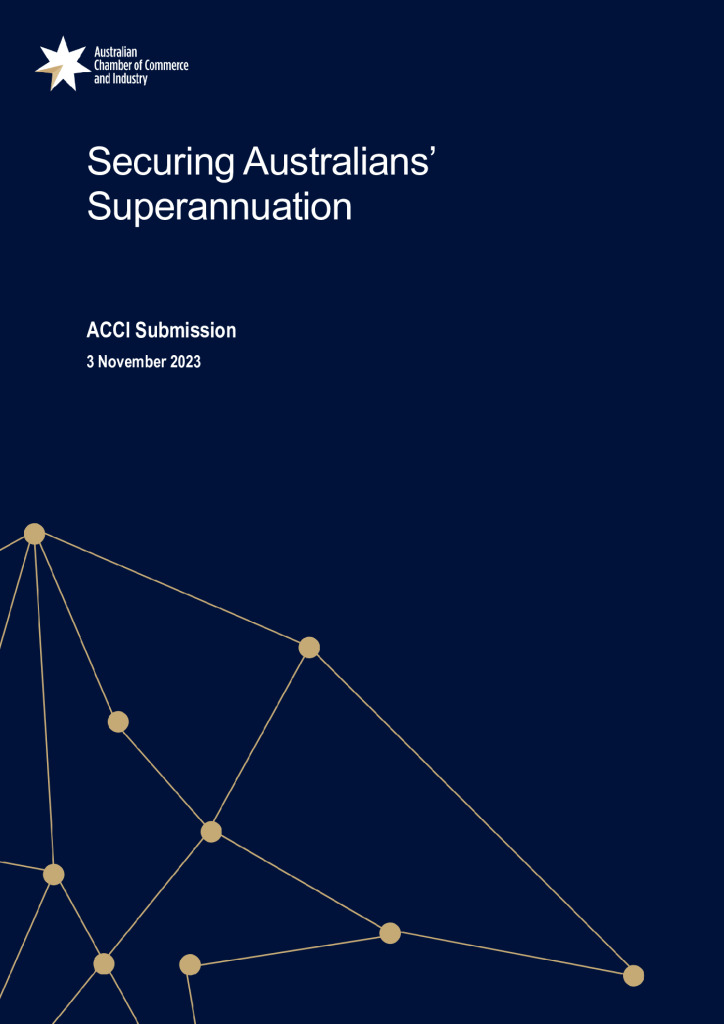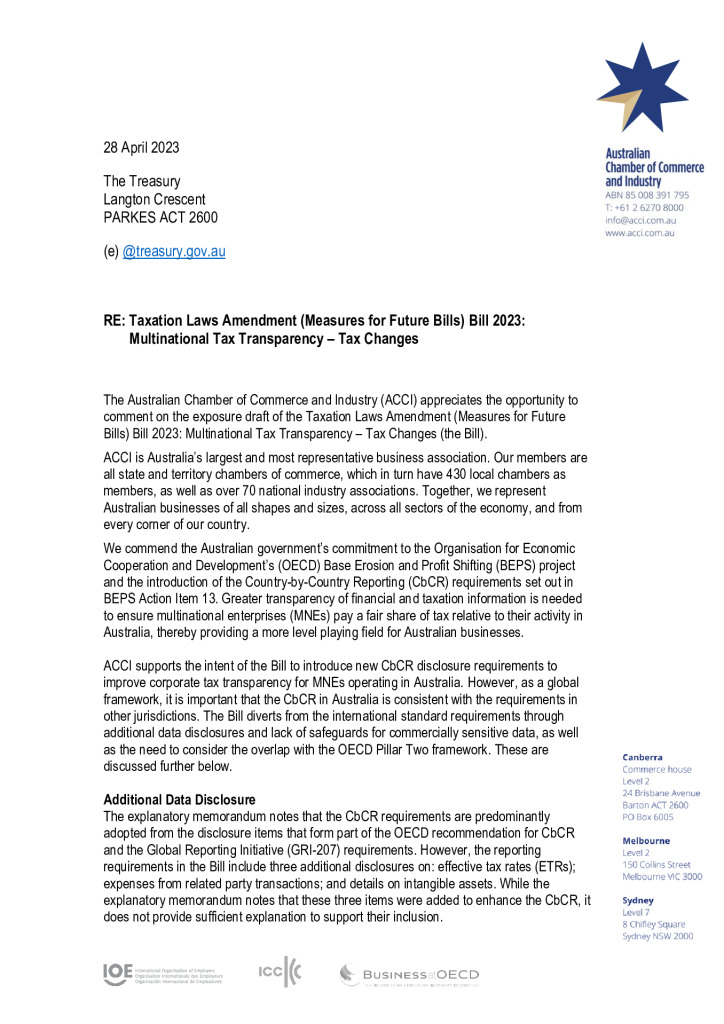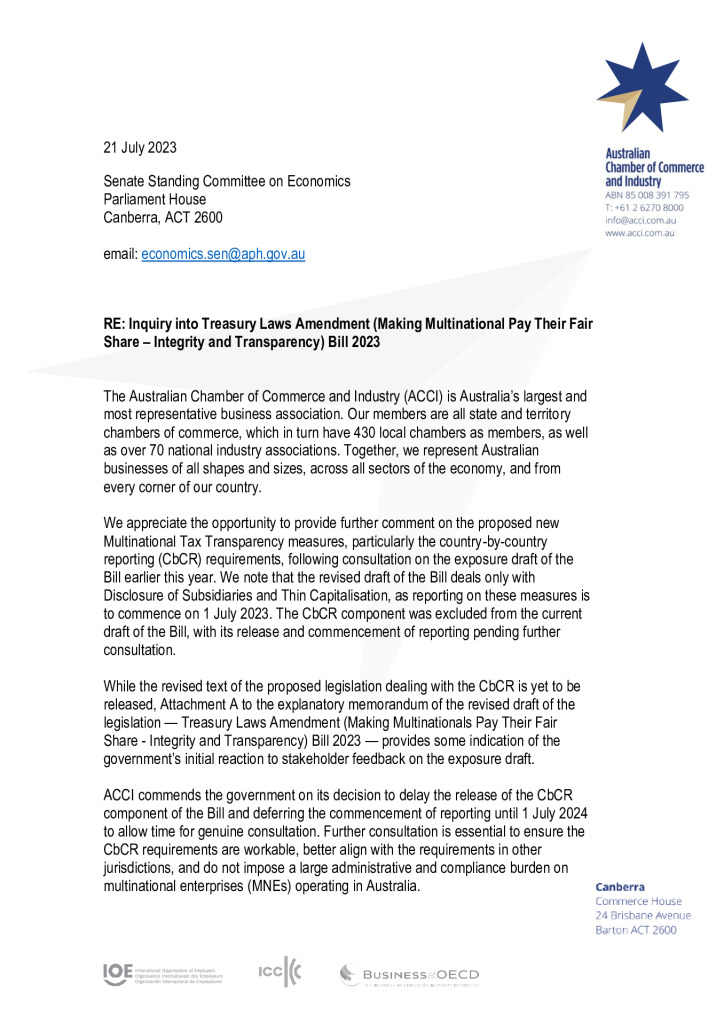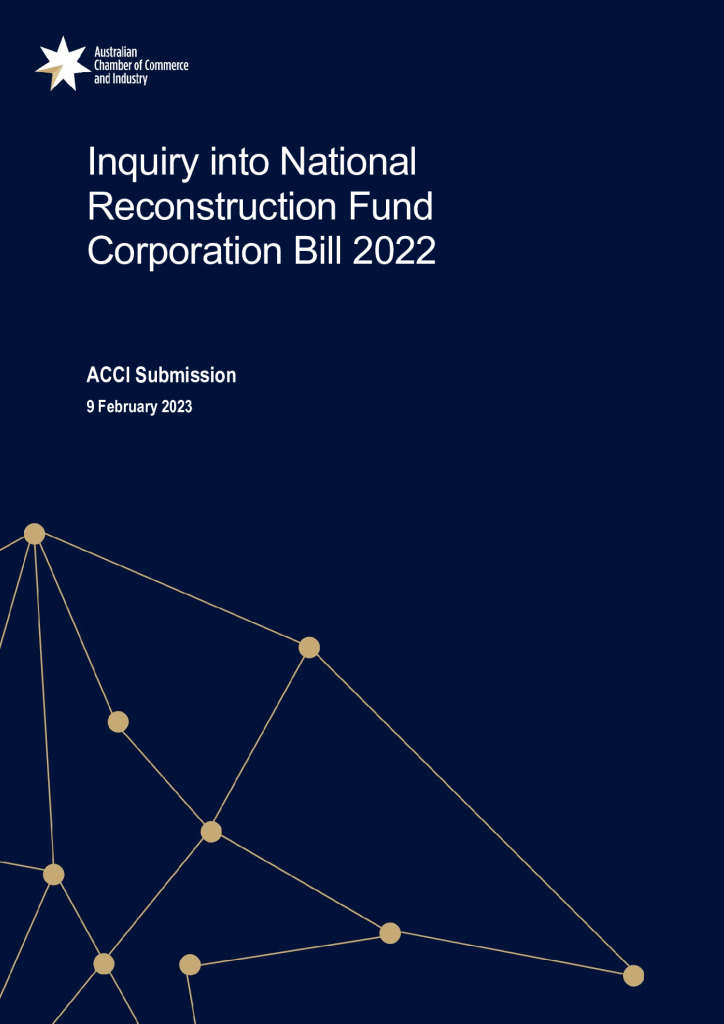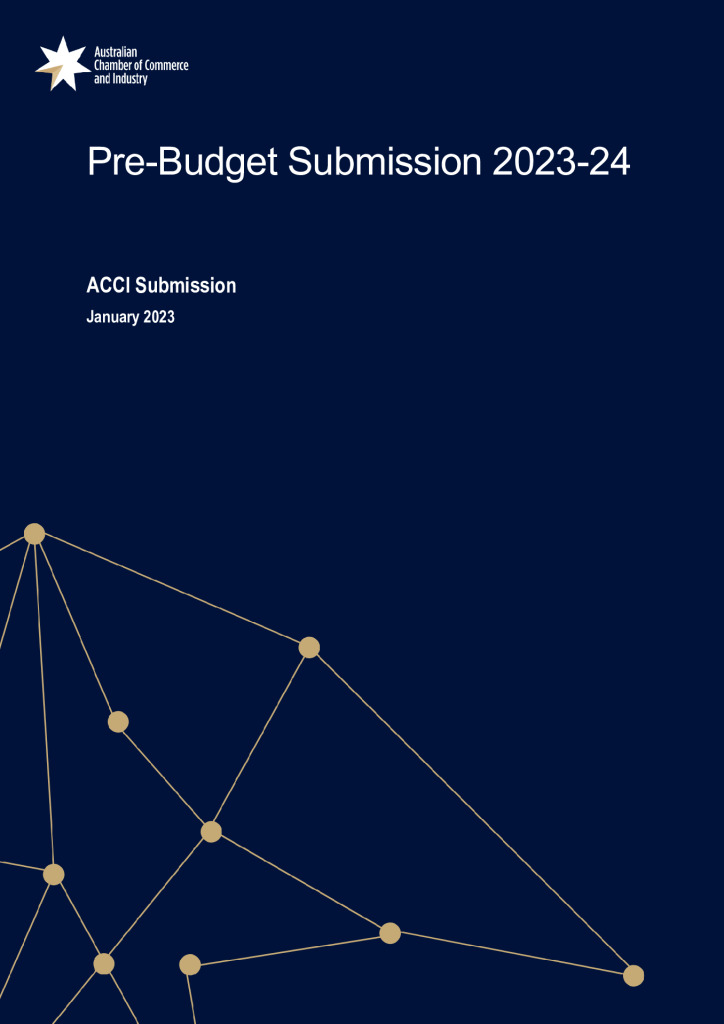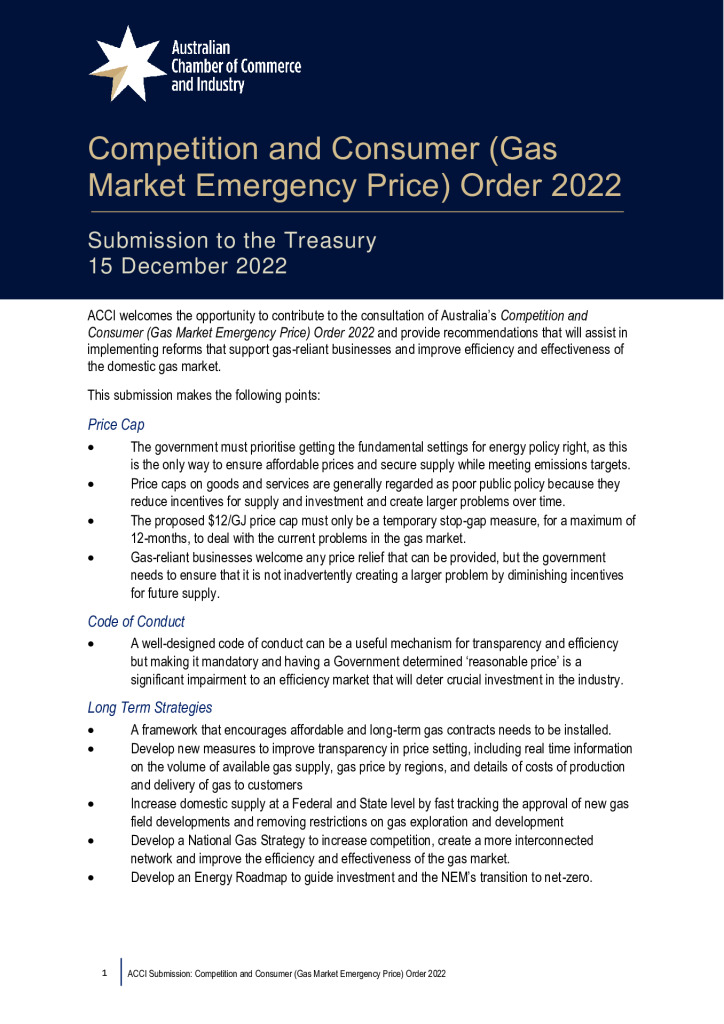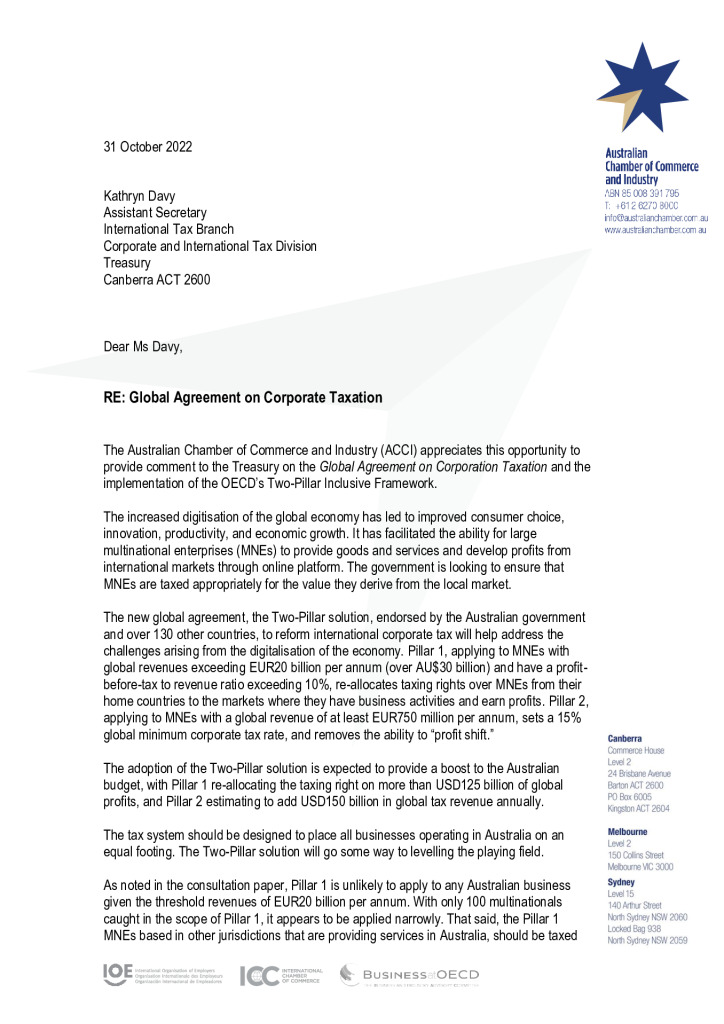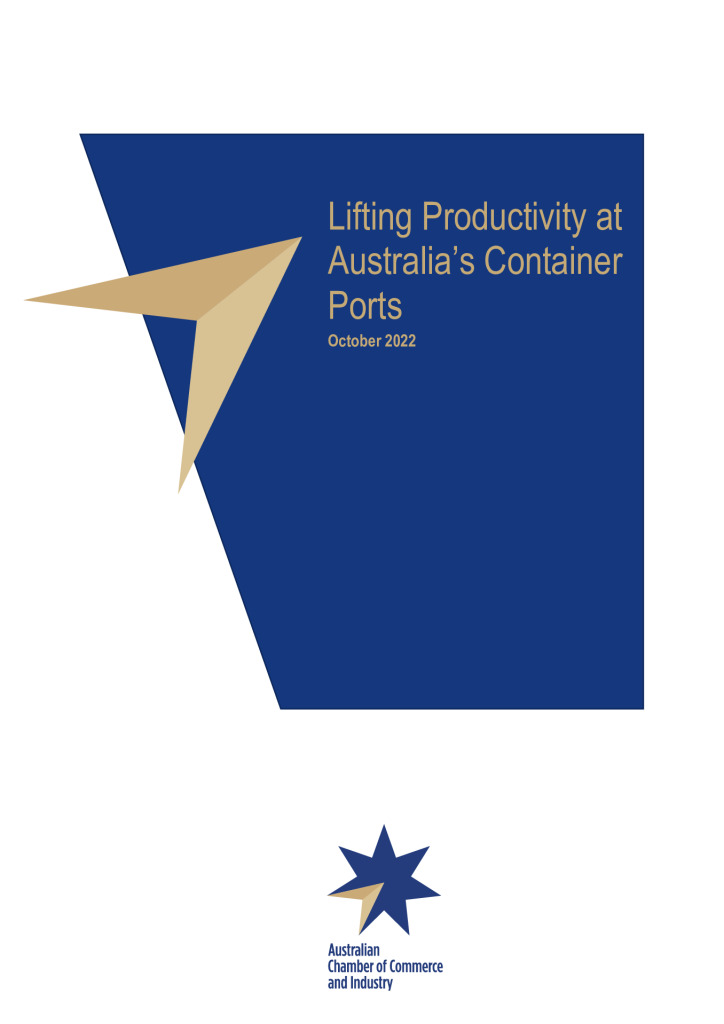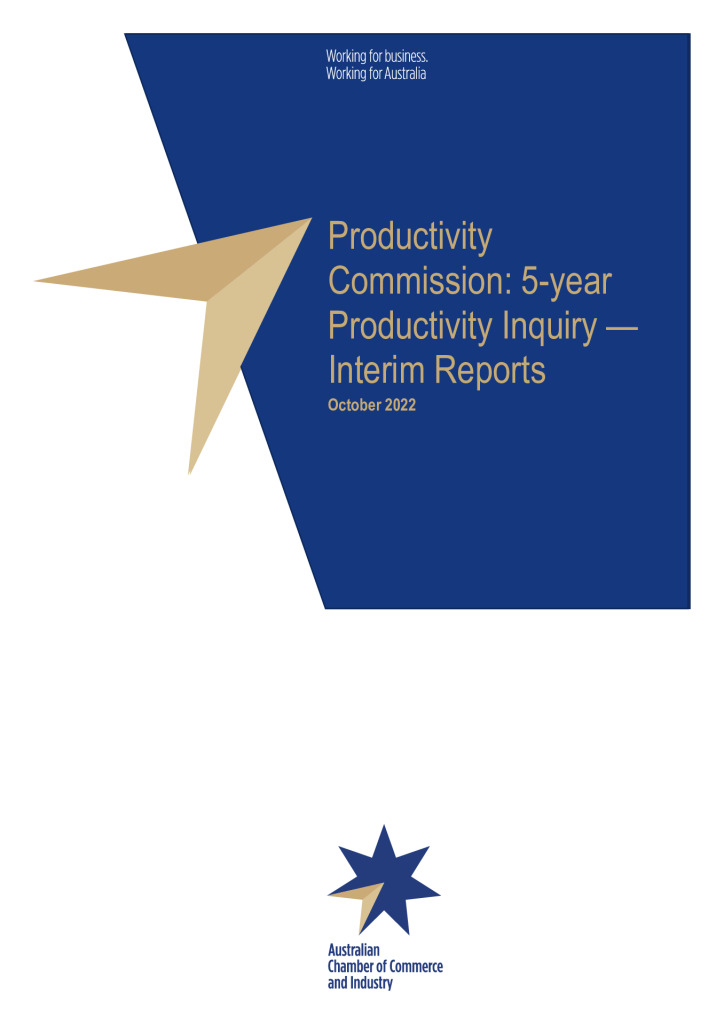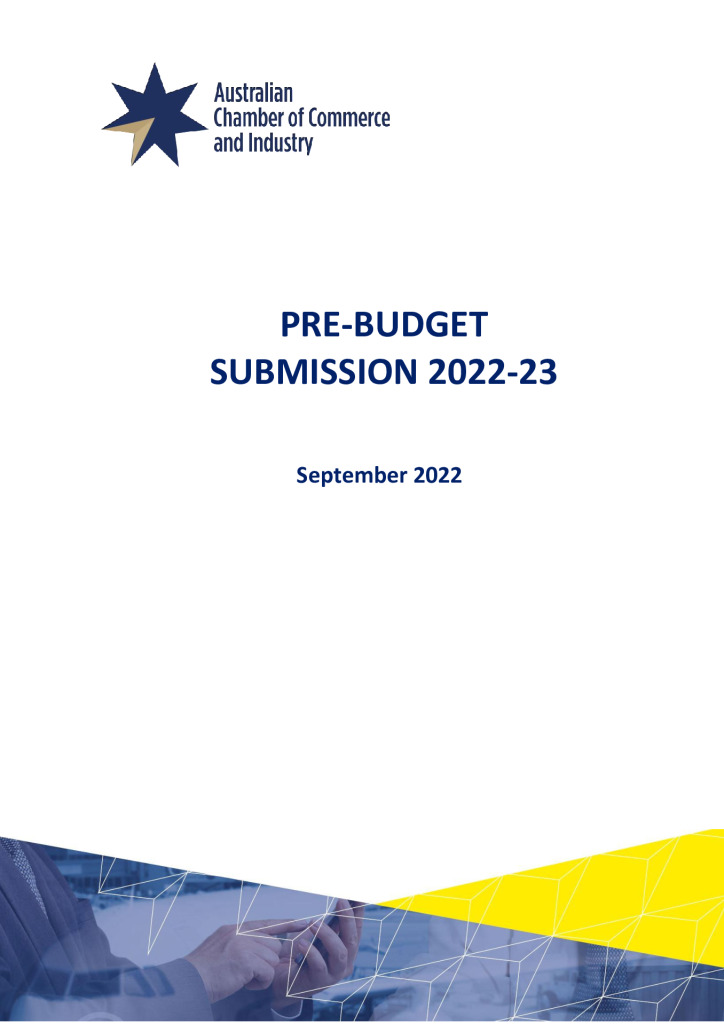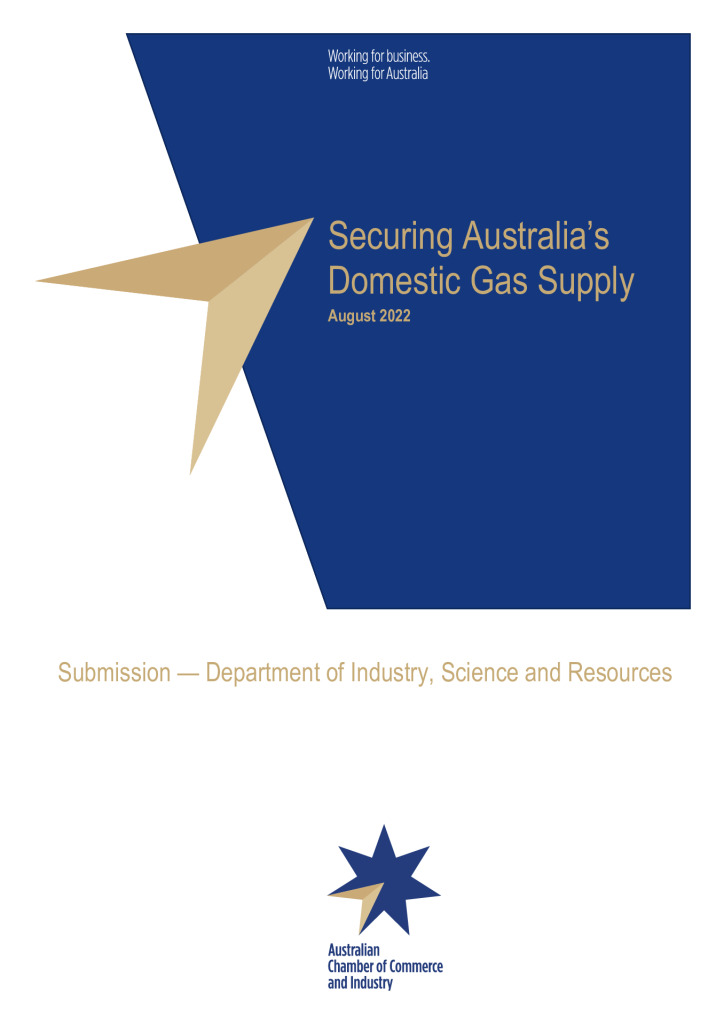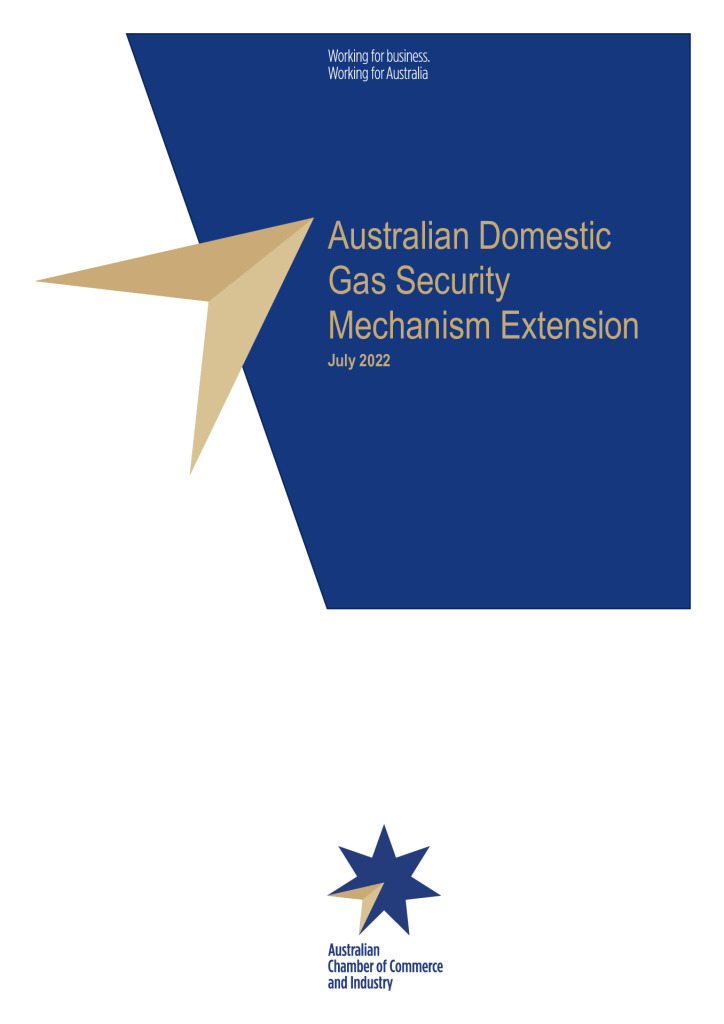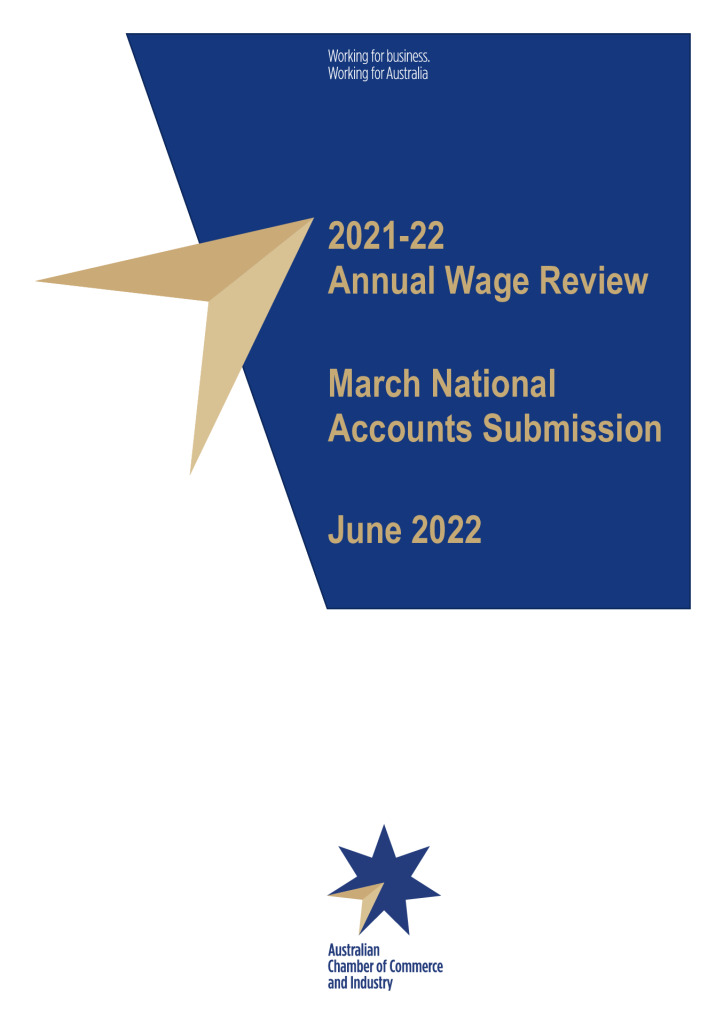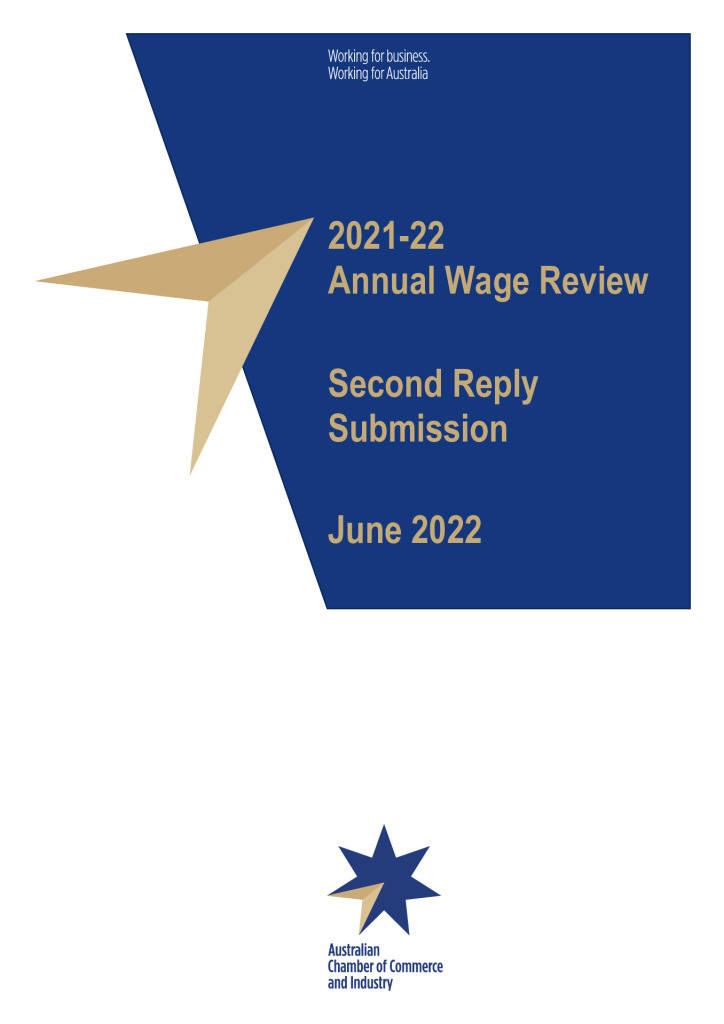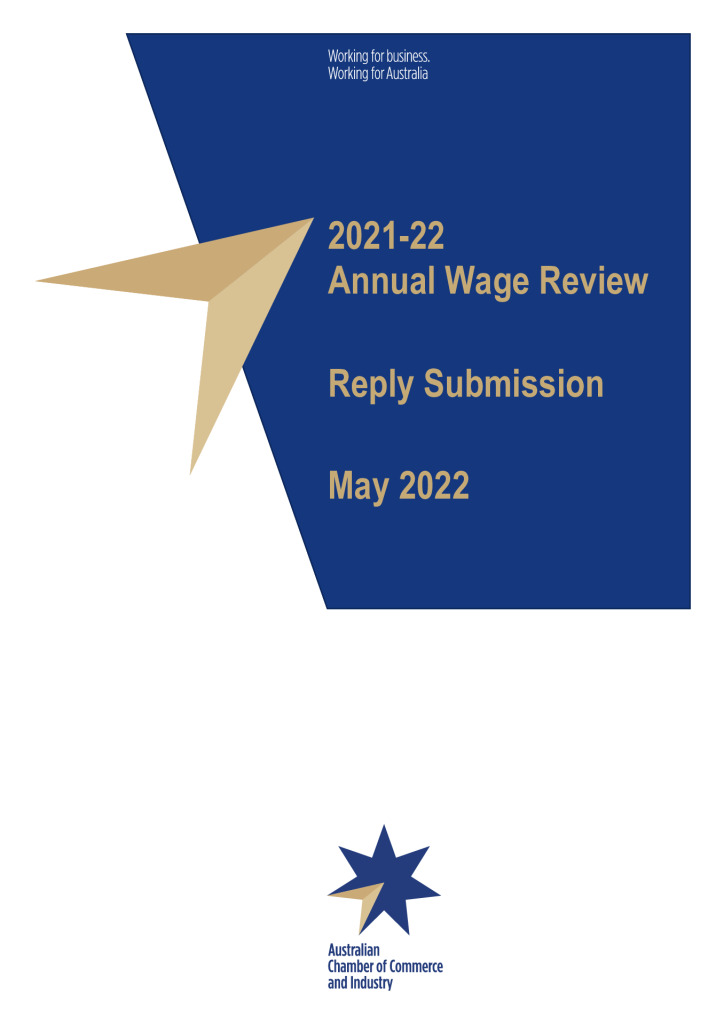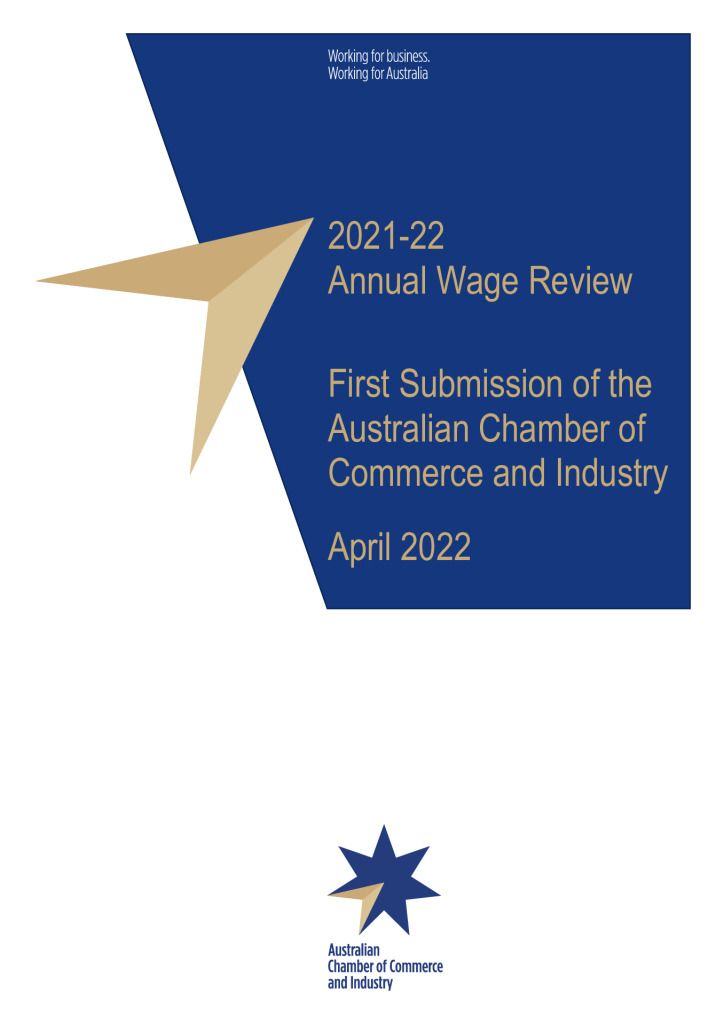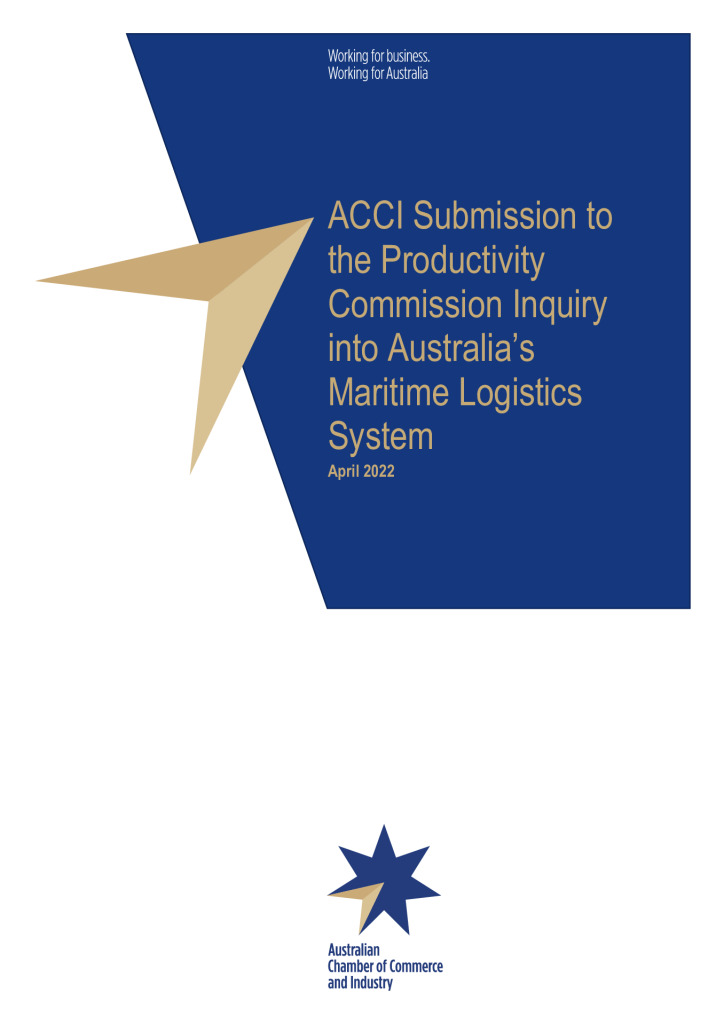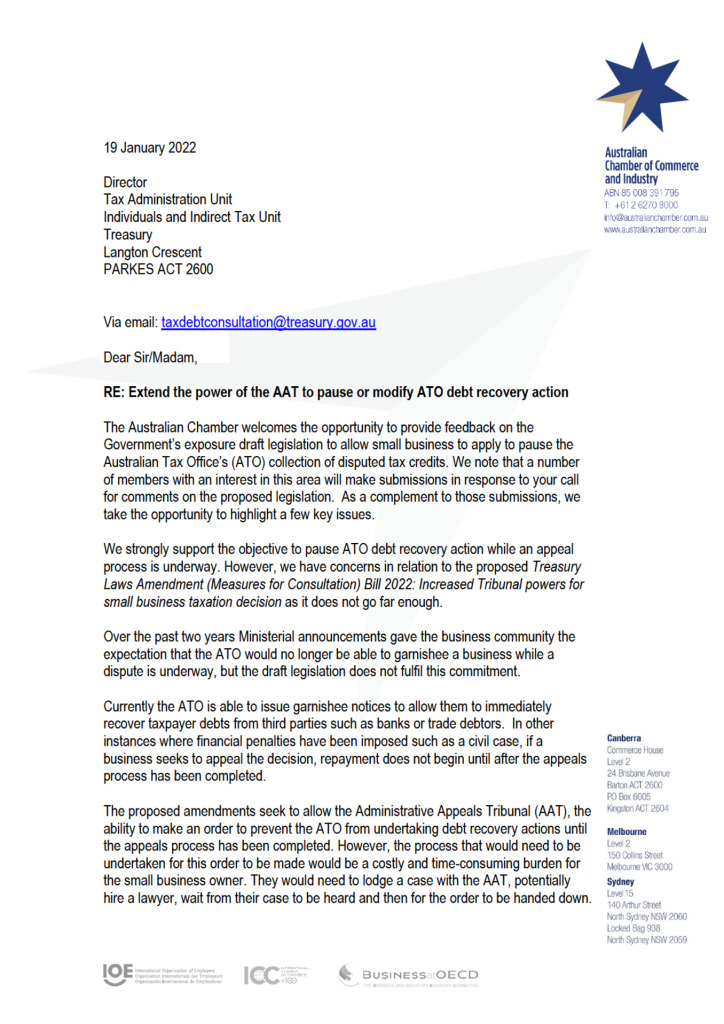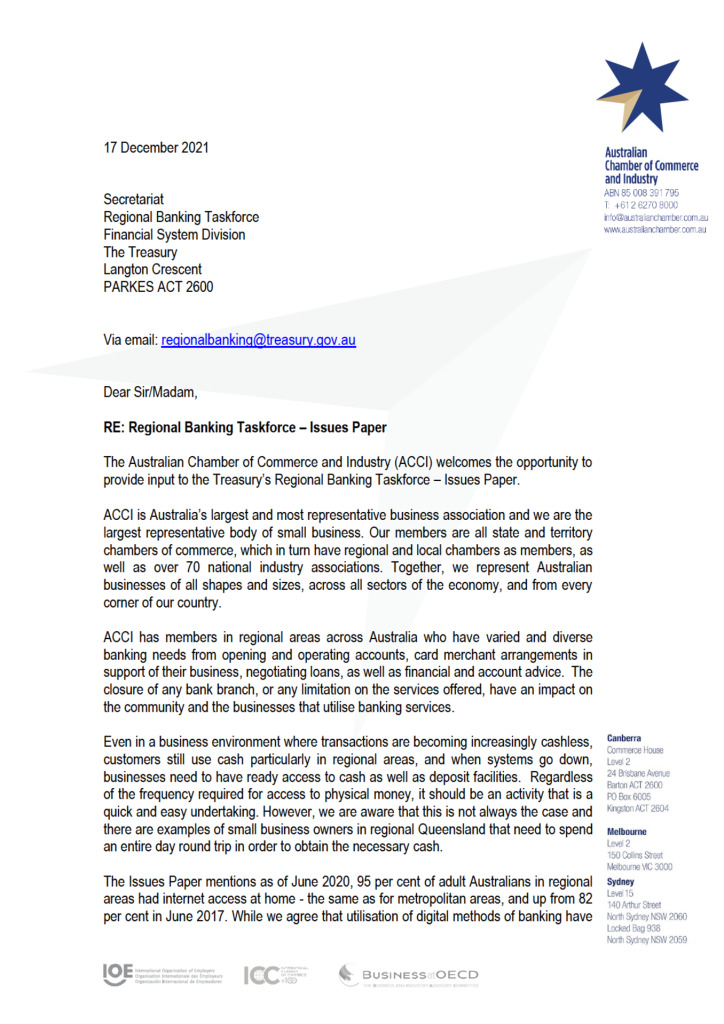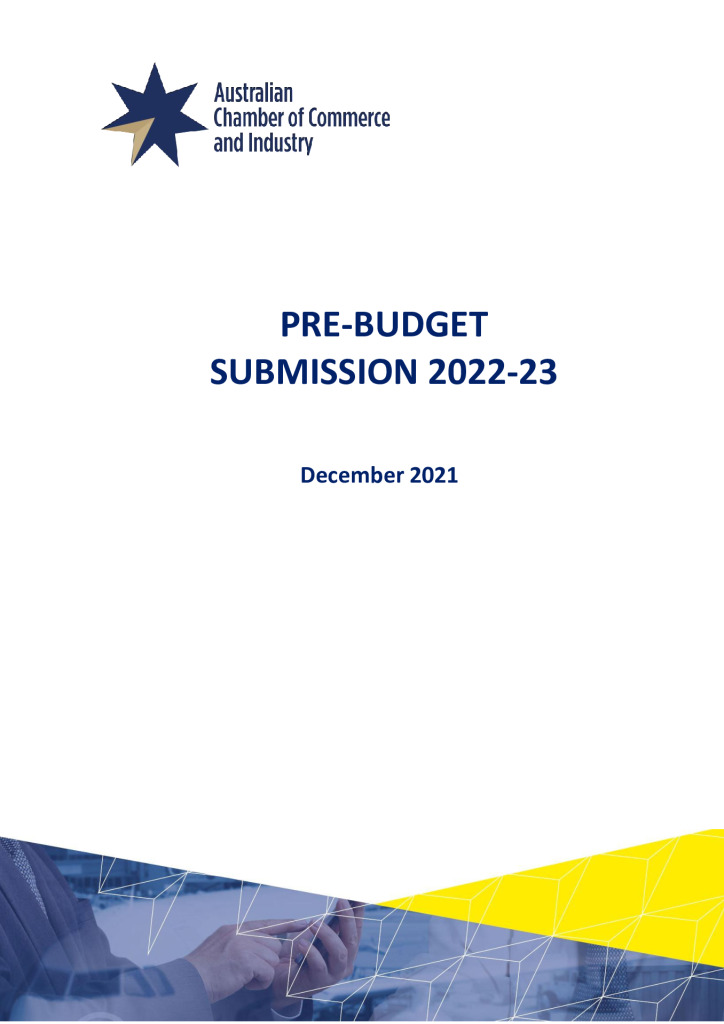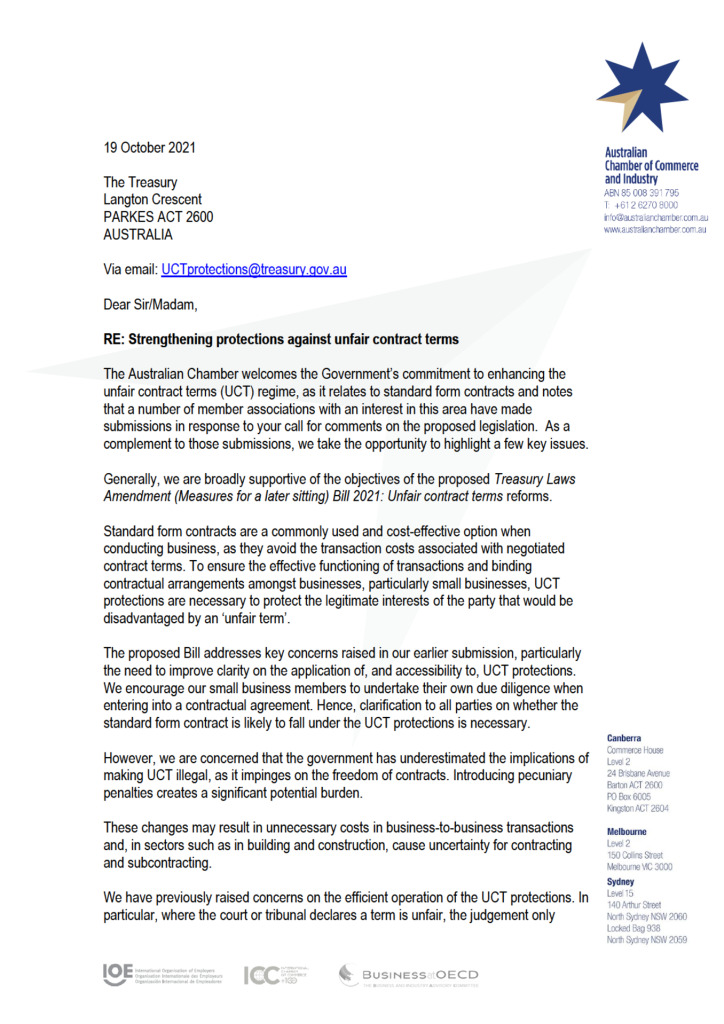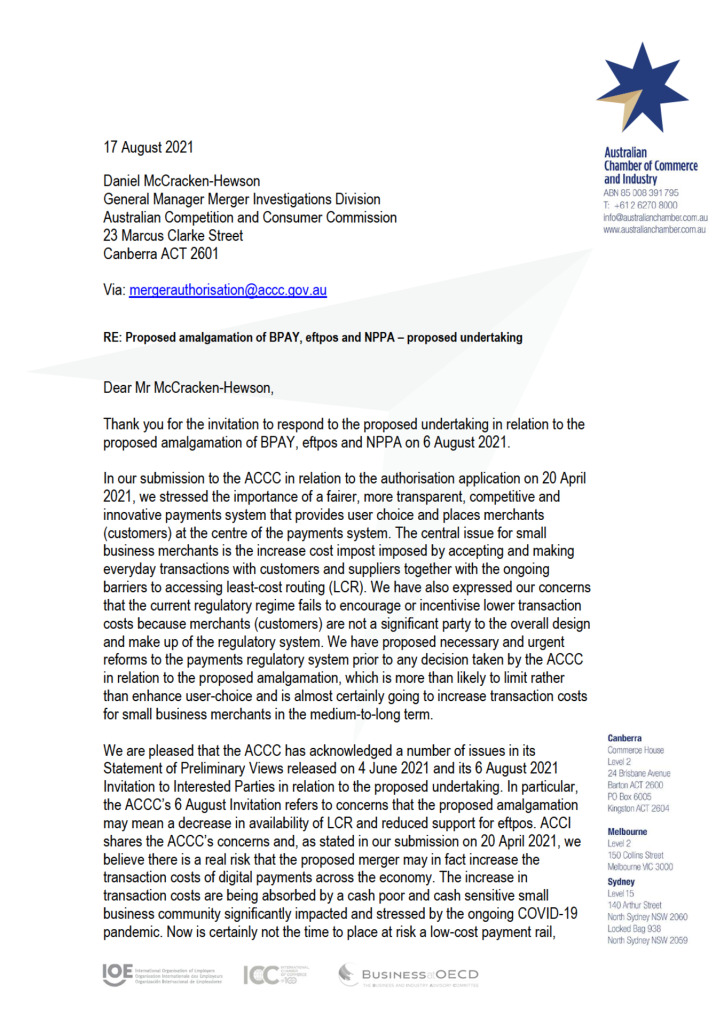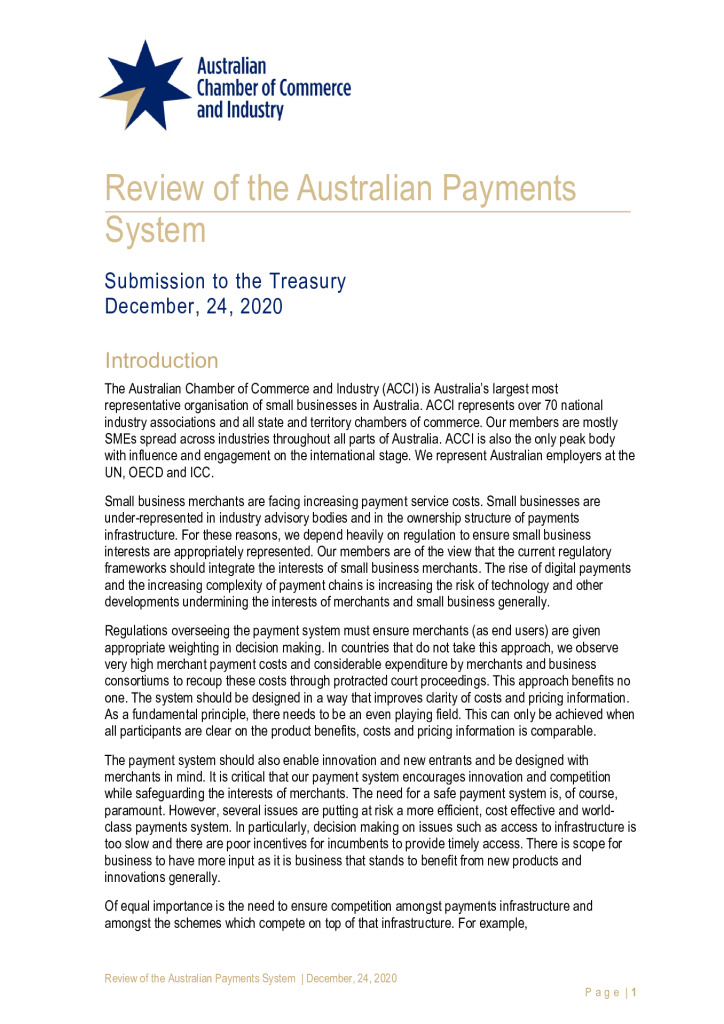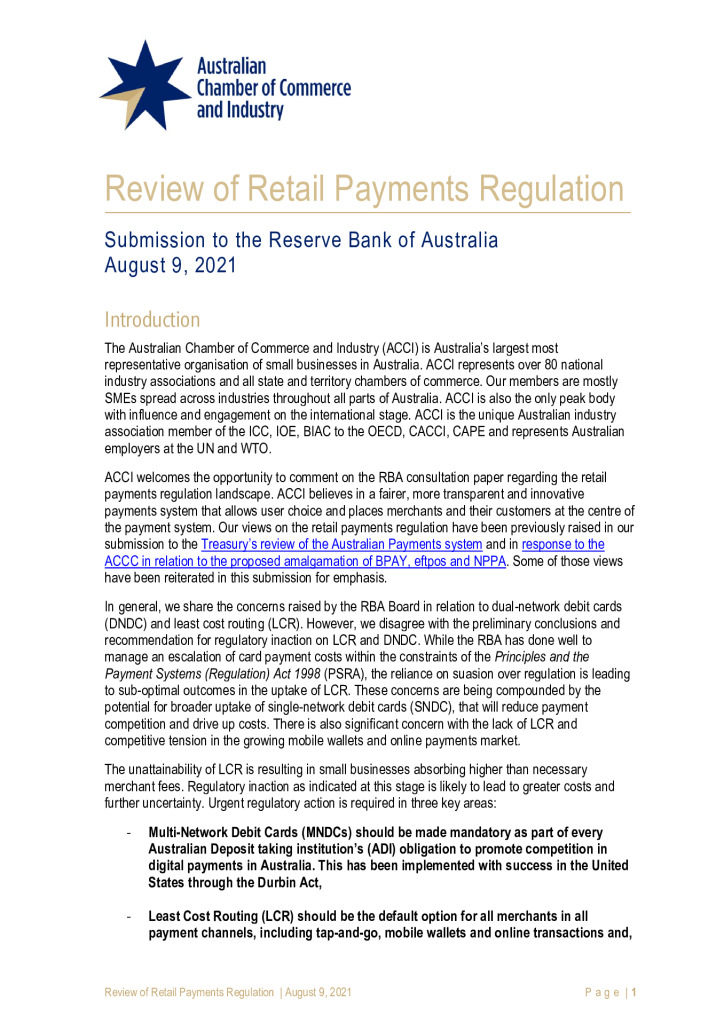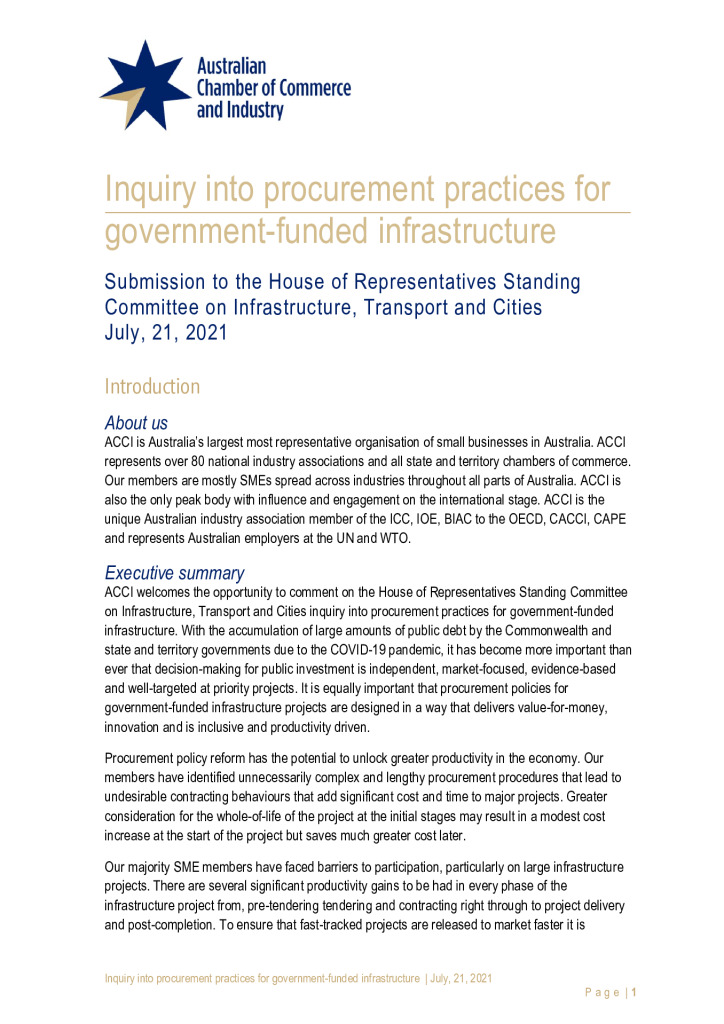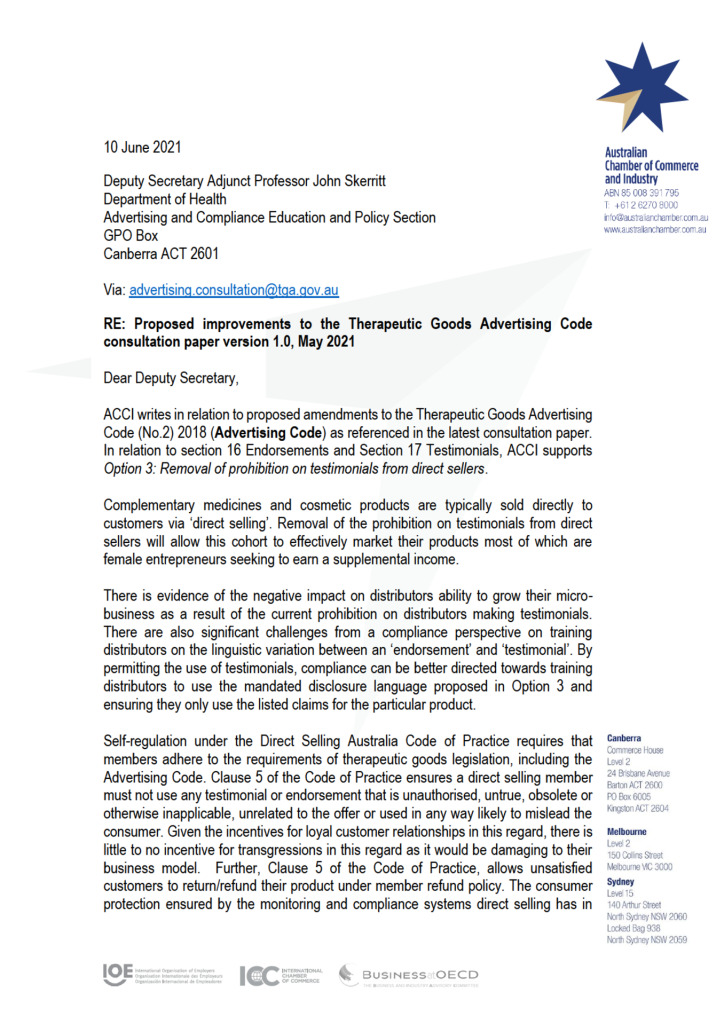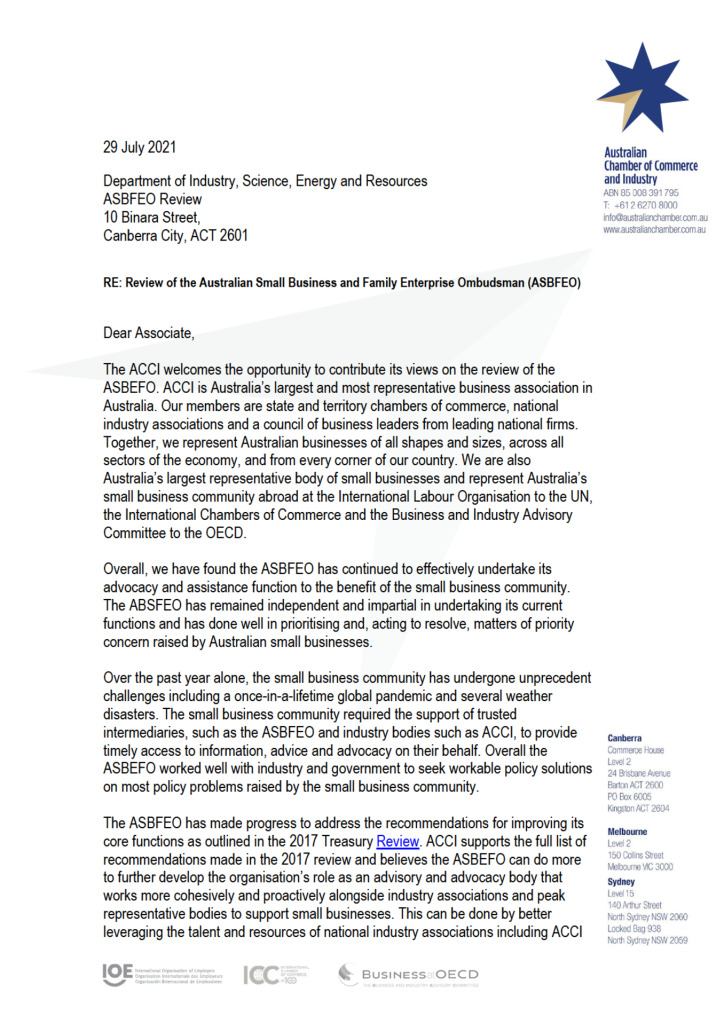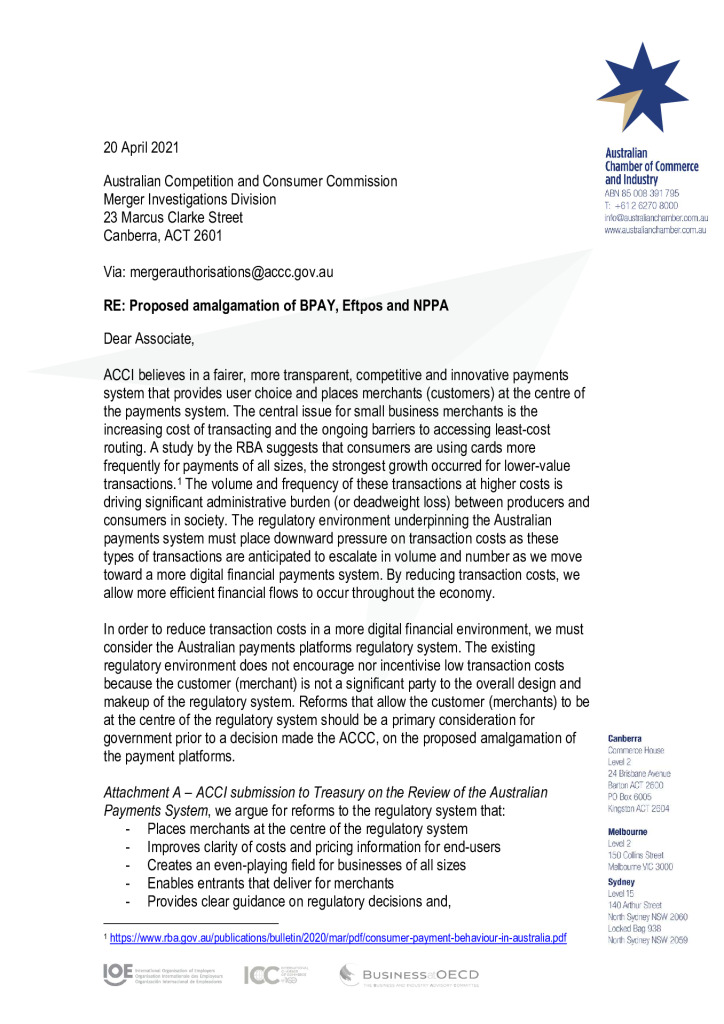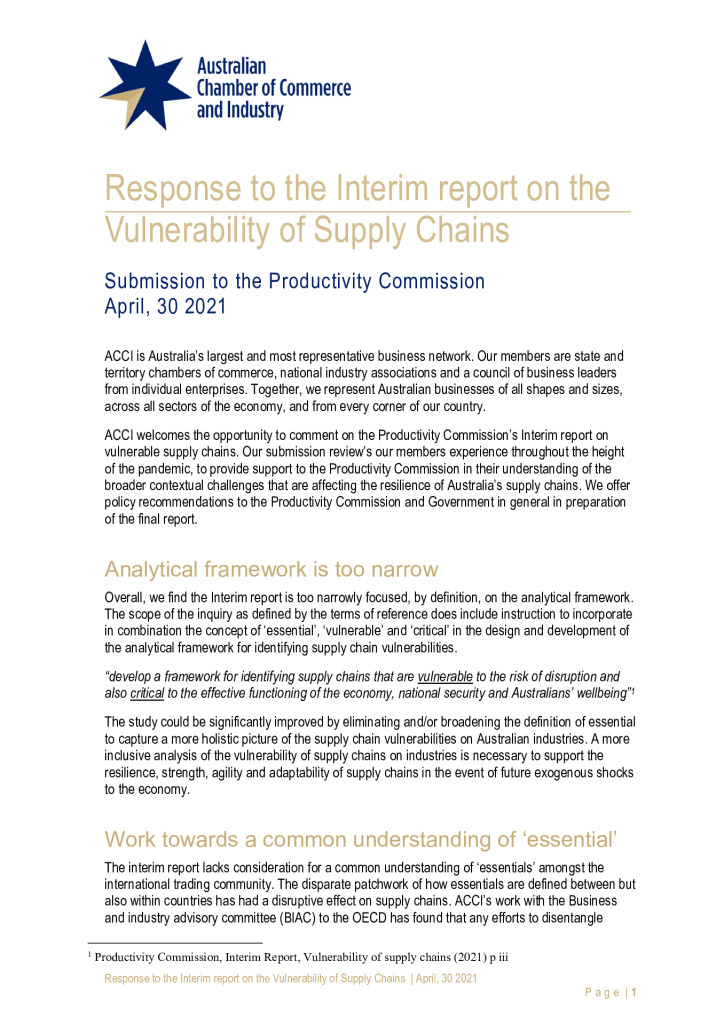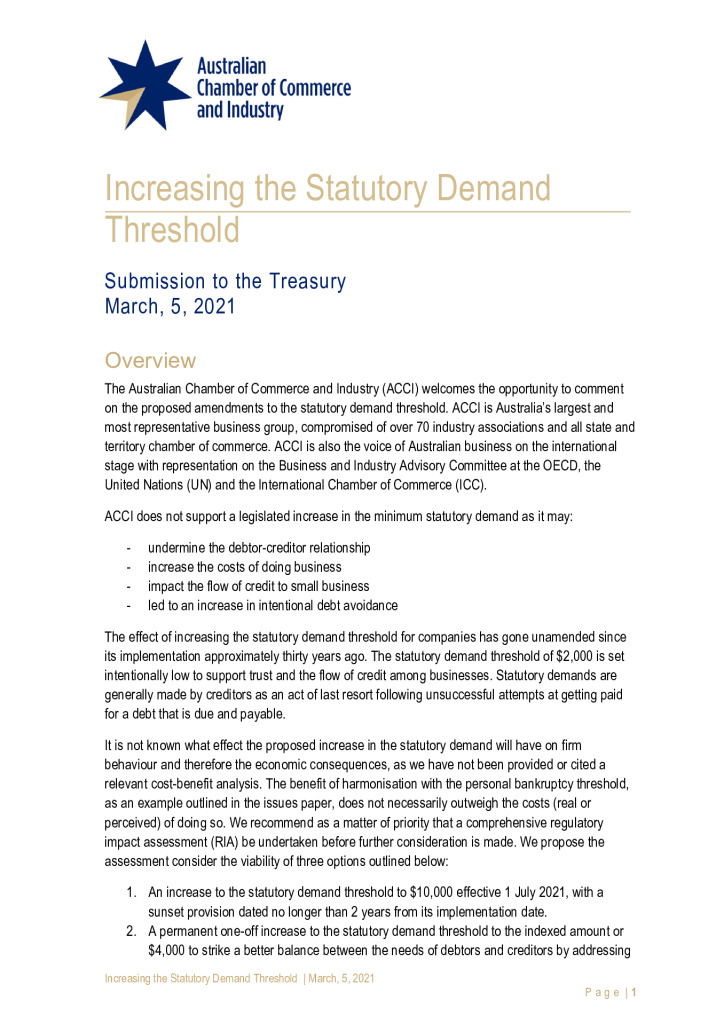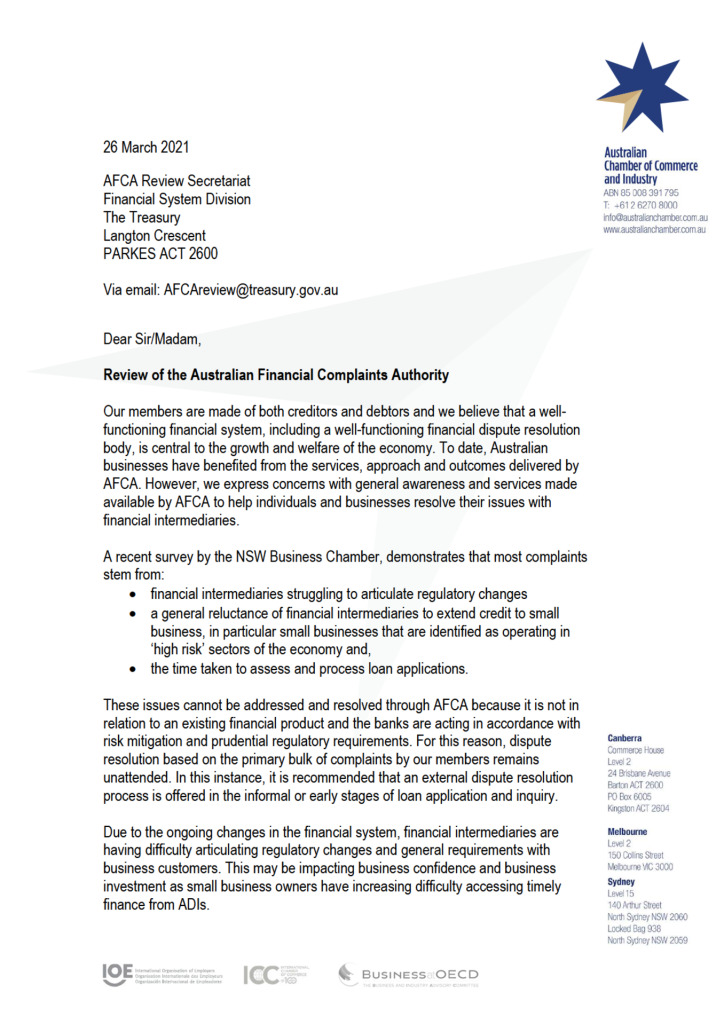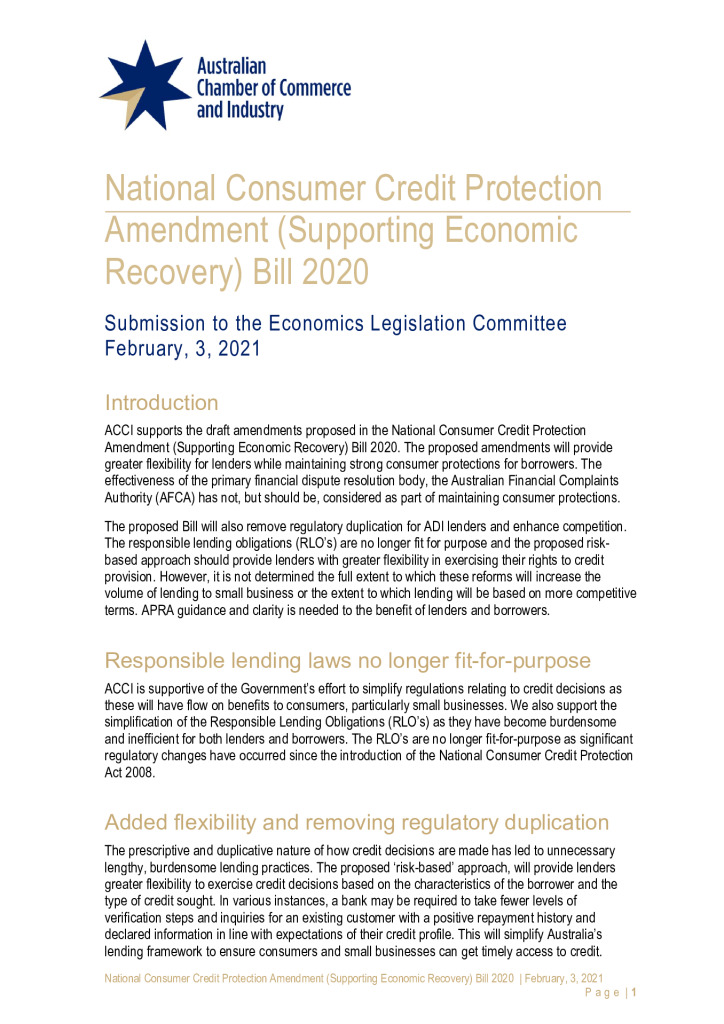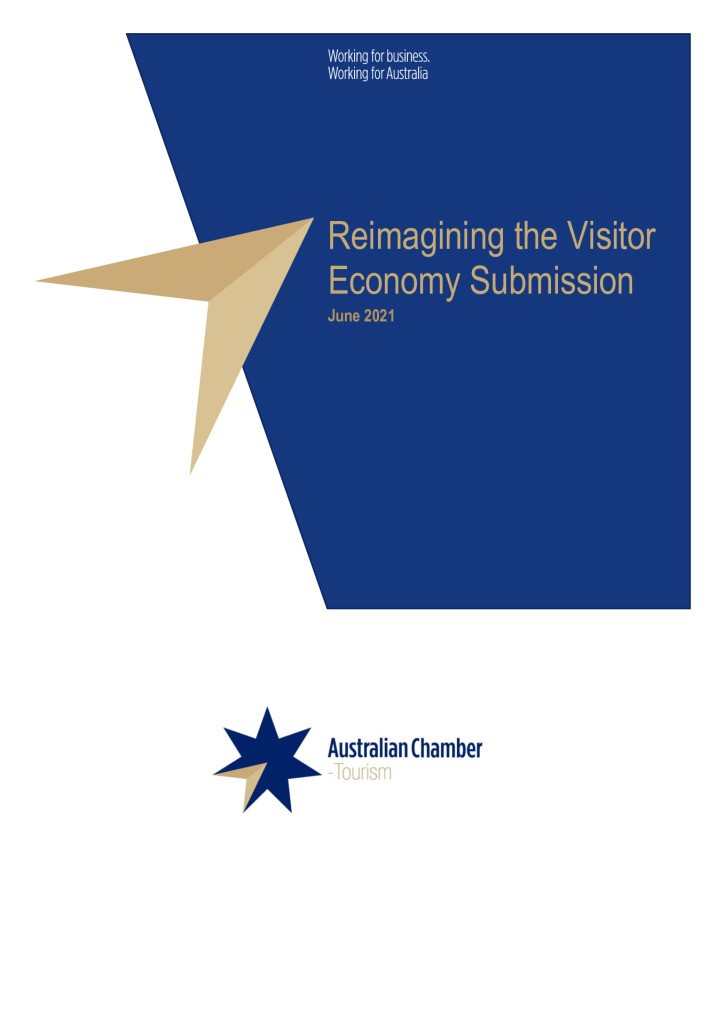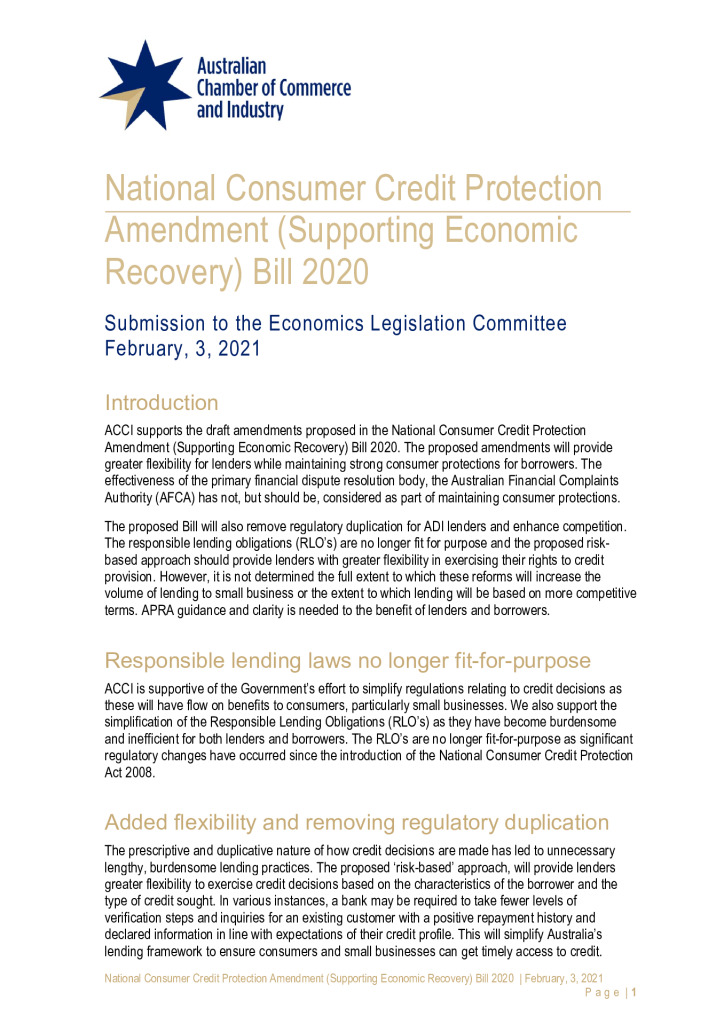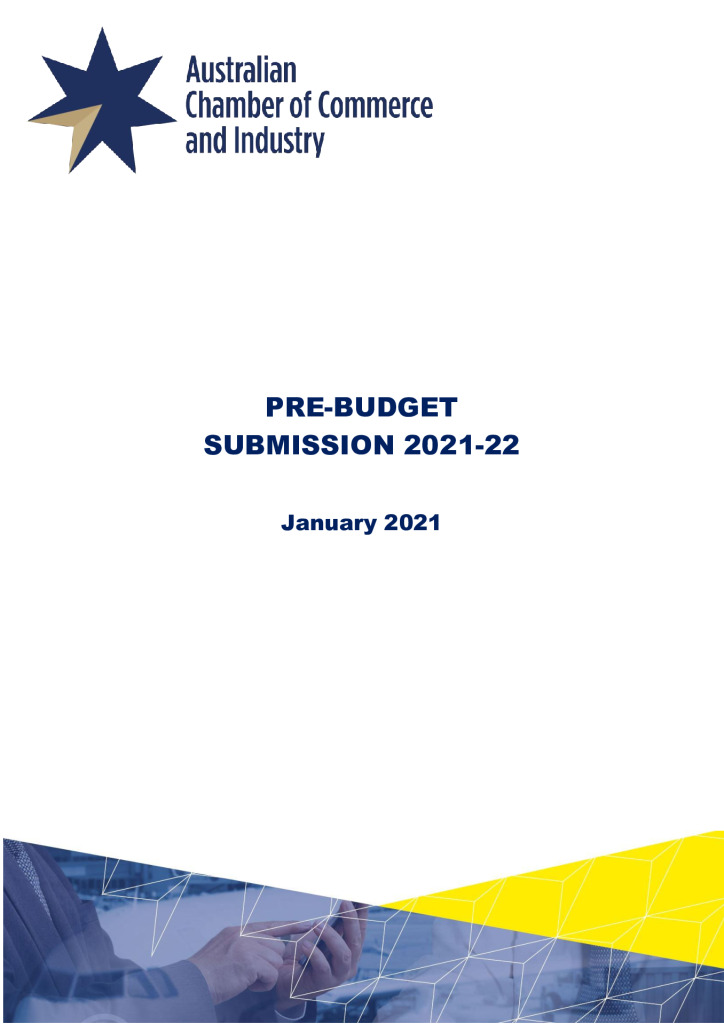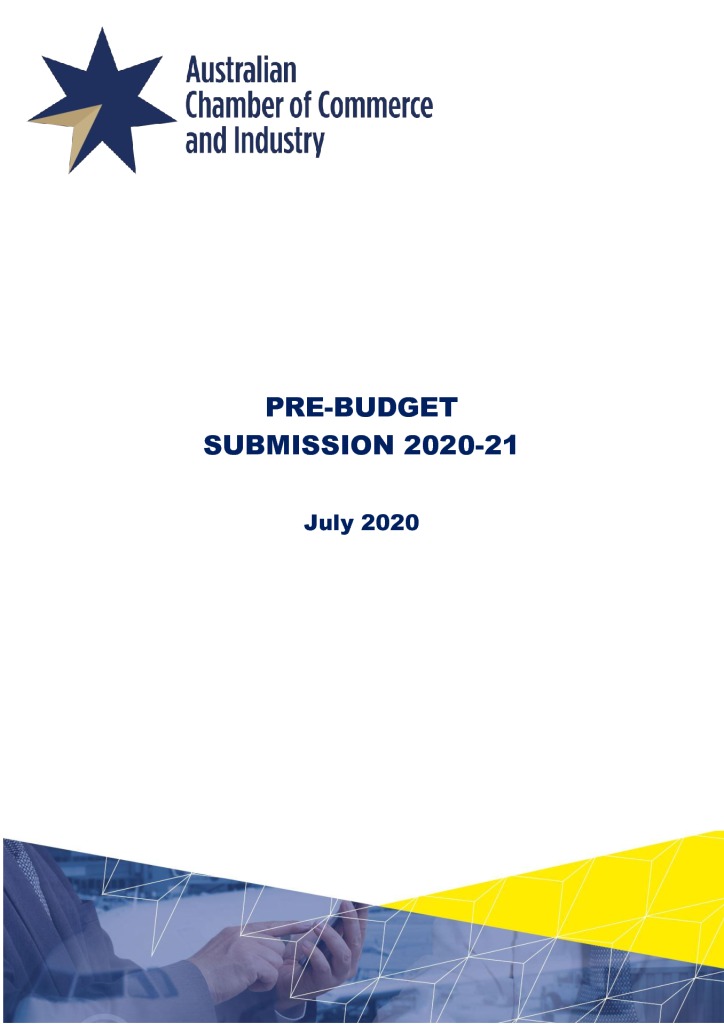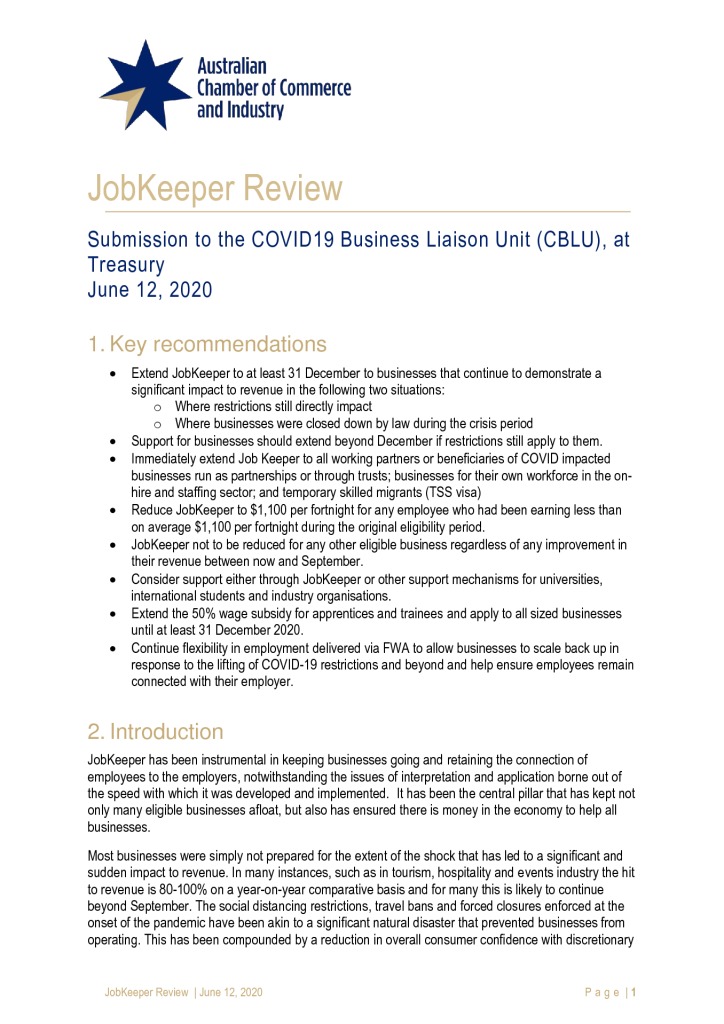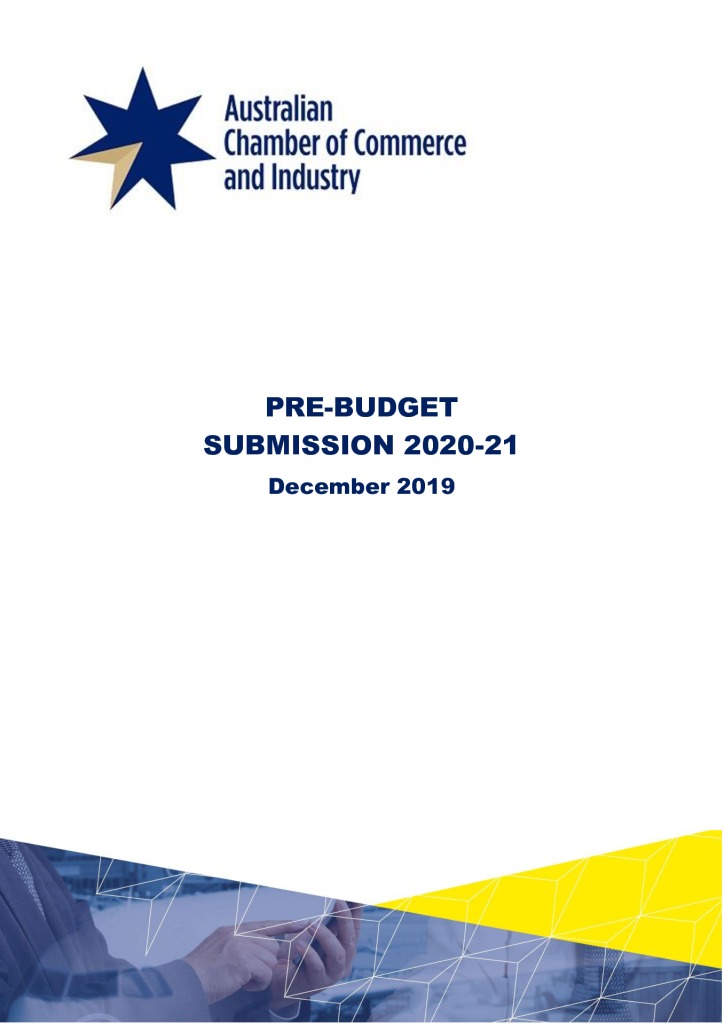Member Login
Economics
See below for submissions related to economics.
Pre-Budget Submission 2024-25
It has been a difficult year for both Australian businesses and consumers. High inflation, rising interest rates and a very tight labour market substantially increased the cost of doing business and cost of living pressures. Despite the steady increase in costs, businesses have had little opportunity to pass these on through higher prices. With margins shrinking, business profits fell 11 percent in the year to June 2023 and insolvencies are on the rise. For consumers, with falling real wages and increasing mortgage rates, real household disposable income fell 3 per cent in 2022-23.
Securing Australians’ Superannuation
The process to reform the superannuation payment system offers the opportunity to undertake a holistic review of the superannuation guarantee (SG) system. A key objective of the reforms should be to streamline and simplify the end-to-end SG payment process, both in terms of reporting and the payment.
Taxation Laws Amendment (Measures for Future Bills) Bill 2023: Multinational Tax Transparency – Tax Changes
We commend the Australian government’s commitment to the Organisation for Economic Cooperation and Development’s (OECD) Base Erosion and Profit Shifting (BEPS) project and the introduction of the Country-by-Country Reporting (CbCR) requirements set out in BEPS Action Item 13. Greater transparency of financial and taxation information is needed to ensure multinational enterprises (MNEs) pay a fair share of tax relative to their activity in Australia, thereby providing a more level playing field for Australian businesses.
Inquiry into Treasury Laws Amendment (Making Multinational Pay Their Fair Share – Integrity and Transparency) Bill 2023
ACCI commends the government on its decision to delay the release of the CbCR component of the Bill and deferring the commencement of reporting until 1 July 2024 to allow time for genuine consultation. Further consultation is essential to ensure the CbCR requirements are workable, better align with the requirements in other jurisdictions, and do not impose a large administrative and compliance burden on multinational enterprises (MNEs) operating in Australia.
Inquiry into National Reconstruction Fund Corporation Bill 2022
ACCI supports the objective of the $15 billion National Reconstruction Fund (NRF) to diversify and grow Australian industry through co-investment in projects in sectors where Australia has competitive strengths. However, to ensure the NRF operates efficiently and effectively, ACCI urges amendments to this Bill.
Pre-Budget Submission 2023-24
The May 2023 Budget offers the government the first real opportunity to change the Budget parameters and re-establish its fiscal position. It must take concrete steps to put Australia on the path to fiscal and economic health, dealing substantively with spending and revenue measures. This is vital to giving business the confidence that the nation’s finances are under control and thereby unlock reservoirs of investment.
Competition and Consumer (Gas Market Emergency Price) Order 2022
ACCI welcomes the opportunity to contribute to the consultation of Australia’s Competition and Consumer (Gas Market Emergency Price) Order 2022 and provide recommendations that will assist in implementing reforms that support gas-reliant businesses and improve efficiency and effectiveness of the domestic gas market.
Global Agreement on Corporate Taxation
The Australian Chamber of Commerce and Industry (ACCI) appreciates this opportunity to provide comment to the Treasury on the Global Agreement on Corporation Taxation and the implementation of the OECD’s Two-Pillar Inclusive Framework.
Lifting Productivity at Australia’s Container Ports
The Australian Chamber of Commerce and Industry (ACCI) welcome the opportunity to respond to the draft report on Lifting productivity at Australia’s container ports: between water, wharf and warehouse (the draft report).
Productivity Commission: 5-year Productivity Inquiry — Interim Reports
ACCI welcomes the opportunity to contribute to the review of Australia’s productivity performance and provide recommendations that will assist governments to make productivity enhancing reforms.
PRE-BUDGET SUBMISSION 2022-23 | September 2022
Australia has weathered the COVID pandemic relatively well compared with other advanced economies, and it is important to recognise that the Australian economy remains robust. Yet the economy faces strong headwinds from the combined challenges of acute inflationary pressure and a severe labour and skills shortage.
Securing Australia’s Domestic Gas Supply | August 2022
The Australian Chamber of Commerce and Industry welcomes the opportunity to contribute to the Securing Australia’s Domestic Gas Supply Review.
Australian Domestic Gas Security Mechanism Extension | July 2022
The Australian Chamber of Commerce and Industry welcomes the opportunity to comment on the extension of the Australian Domestic Gas Market Security Mechanism (ADGSM).
2021-22 Annual Wage Review | March National Accounts Submission
The 2021-22 Annual Wage Review, as with the previous two, is being undertaken in the shadow of the COVID pandemic and under a heavy veil of uncertainty. For this reason, ACCI continues to stress the need for genuine caution and moderation in awarding any increase in the minimum and award minimum wages.
2021-22 Annual Wage Review | Second Reply Submission
ACCI maintains the position that an increase in the minimum and award minimum wage of up to 3% is reasonable in the current economic environment. This achieves the right balance, taking into account the full range of risks and uncertainties facing the Australian economy, workers and businesses.
2021-22 Annual Wage Review | Reply Submission
As ACCI stressed throughout our initial submission:
a. Businesses face continuing and new adversities, with these being felt more severely in sectors with a high proportion of award-reliant employees that are most affected by minimum and award wage increases arising from this review.
b. There are multiple areas of risk and uncertainty, both present and emerging, domestic and geopolitical that are imperative in determining this review.
c. While aggregate national macroeconomic indicators are generally positive, showing the resilience of the Australian economy, there is a wide diversity of experiences between industry sectors and workplaces, and between employees.
2021-22 Annual Wage Review | First Submission of the Australian Chamber of Commerce and Industry
The 2021-22 Annual Wage Review takes place in a period of significant and multi-faceted crises, and multiple significant uncertainties. The COVID-19 pandemic remains prominent and uncertain, continuing to weigh on the economy, restrict business activity, preclude certainty and hinder confidence.
ACCI Submission to the Productivity Commission Inquiry into Australia’s Maritime Logistics System
The Australian Chamber of Commerce and Industry (henceforth ACCI) welcome the opportunity to provide input to the Productivity Commission’s inquiry into Australia’s maritime logistics system. ACCI represents a diverse network of businesses, industry associations, and state and territory chambers of commerce, proving a broad and unique perspective.
Productivity Commission Review of Australia’s Productivity Performance | March 2022
Australia’s productivity performance has been waning over the past two decades, with labour productivity growth hovering around 1% and multifactor productivity barely growing at all. Australia is only a middle ranking economy in terms of productivity — behind most comparable countries, including the United States, United Kingdom, Germany and France — placing Australia at a clear competitive disadvantage.
Extend the power of the AAT to pause or modify ATO debt recovery action
The Australian Chamber welcomes the opportunity to provide feedback on the Government’s exposure draft legislation to allow small business to apply to pause the Australian Tax Office’s (ATO) collection of disputed tax credits. We note that a number of members with an interest in this area will make submissions in response to your call for comments on the proposed legislation. As a complement to those submissions, we take the opportunity to highlight a few key issues.
Regional Banking Taskforce – Issues Paper
The Australian Chamber of Commerce and Industry (ACCI) welcomes the opportunity to provide input to the Treasury’s Regional Banking Taskforce – Issues Paper.
2022-23 Pre-Budget Submission | December 2021
The 2022 Budget comes at a crucial time for the Australian economy in the recovery from the COVID-19 pandemic. The economy bounced back from the first wave of infections in the first half of 2020, with economic activity and employment returning to pre-COVID levels by the first quarter of 2021.
Strengthening protections against unfair contract terms
The Australian Chamber welcomes the Government’s commitment to enhancing the unfair contract terms (UCT) regime, as it relates to standard form contracts and notes that a number of member associations with an interest in this area have made submissions in response to your call for comments on the proposed legislation. As a complement to those submissions, we take the opportunity to highlight a few key issues.
Proposed amalgamation of BPAY, eftpos and NPPA – proposed undertaking
ACCI is pleased that the ACCC has acknowledged a number of issues in its Statement of Preliminary Views released on 4 June 2021 and its 6 August 2021 Invitation to Interested Parties in relation to the proposed undertaking. In particular, the ACCC’s 6 August Invitation refers to concerns that the proposed amalgamation may mean a decrease in availability of LCR and reduced support for eftpos. ACCI shares the ACCC’s concerns and, as stated in our submission on 20 April 2021, we believe there is a real risk that the proposed merger may in fact increase the transaction costs of digital payments across the economy. The increase in transaction costs are being absorbed by a cash poor and cash sensitive small business community significantly impacted and stressed by the ongoing COVID-19 pandemic. Now is certainly not the time to place at risk a low-cost payment rail, particularly when a greater proportion of businesses are accepting online and digital payments from their customers.
Review of the Australian Payments System
Small business merchants are facing increasing payment service costs. Small businesses are under-represented in industry advisory bodies and in the ownership structure of payments infrastructure. For these reasons, we depend heavily on regulation to ensure small business interests are appropriately represented. Our members are of the view that the current regulatory frameworks should integrate the interests of small business merchants. The rise of digital payments and the increasing complexity of payment chains is increasing the risk of technology and other developments undermining the interests of merchants and small business generally.
Download
147719_acci_0
PDF 522.43 KB
Review of Retail Payments Regulation
ACCI welcomes the opportunity to comment on the RBA consultation paper regarding the retail payments regulation landscape. ACCI believes in a fairer, more transparent and innovative payments system that allows user choice and places merchants and their customers at the centre of the payment system. Our views on the retail payments regulation have been previously raised in our submission to the Treasury’s review of the Australian Payments system and in response to the ACCC in relation to the proposed amalgamation of BPAY, eftpos and NPPA. Some of those views have been reiterated in this submission for emphasis.
Download
acci-2021-07-09
PDF 545.6 KB
Inquiry into procurement practices for government-funded infrastructure | Submission to the House of Representatives Standing Committee on Infrastructure, Transport, and Cities
ACCI welcomes the opportunity to comment on the House of Representatives Standing Committee on Infrastructure, Transport and Cities inquiry into procurement practices for government-funded infrastructure. With the accumulation of large amounts of public debt by the Commonwealth and state and territory governments due to the COVID-19 pandemic, it has become more important than ever that decision-making for public investment is independent, market-focused, evidence-based and well-targeted at priority projects. It is equally important that procurement policies for government-funded infrastructure projects are designed in a way that delivers value-for-money, innovation and is inclusive and productivity driven.
Consultation Paper of Proposed Improvements to the Therapeutic Goods Advertising Code Version 1.0, May 2021
ACCI writes in relation to proposed amendments to the Therapeutic Goods Advertising Code (No.2) 2018 (Advertising Code) as referenced in the latest consultation paper. In relation to section 16 Endorsements and Section 17 Testimonials, ACCI supports Option 3: Removal of prohibition on testimonials from direct sellers.
Australian Small Business and Family Enterprise Ombudsman (ASBFEO) Review
ACCI have found the ASBFEO has continued to effectively undertake its advocacy and assistance function to the benefit of the small business community. The ABSFEO has remained independent and impartial in undertaking its current functions and has done well in prioritising and, acting to resolve, matters of priority concern raised by Australian small businesses.
Proposed amalgamation of BPAY, EFTPOS and NPPA
ACCI believes in a fairer, more transparent, competitive and innovative payments system that provides user choice and places merchants (customers) at the centre of the payments system. The central issue for small business merchants is the increasing cost of transacting and the ongoing barriers to accessing least-cost routing.
Response to the Interim report on the Vulnerability of Supply Chains | Submission to the Productivity Commission
ACCI welcomes the opportunity to comment on the Productivity Commission’s Interim report on vulnerable supply chains. Our submission review’s our members experience throughout the height of the pandemic, to provide support to the Productivity Commission in their understanding of the broader contextual challenges that are affecting the resilience of Australia’s supply chains. We offer policy recommendations to the Productivity Commission and Government in general in preparation of the final report.
Increasing the Statutory Demand Threshold | Submission to the Treasury
The effect of increasing the statutory demand threshold for companies has gone unamended since its implementation approximately thirty years ago. The statutory demand threshold of $2,000 is set intentionally low to support trust and the flow of credit among businesses. Statutory demands are generally made by creditors as an act of last resort following unsuccessful attempts at getting paid for a debt that is due and payable.
Australian Financial Complaints Authority Review
Our members are made of both creditors and debtors and we believe that a well functioning financial system, including a well-functioning financial dispute resolution body, is central to the growth and welfare of the economy. To date, Australian businesses have benefited from the services, approach and outcomes delivered by AFCA. However, we express concerns with general awareness and services made available by AFCA to help individuals and businesses resolve their issues with financial intermediaries.
National Consumer Credit Protection Amendment (Supporting Economic Recovery) Bill 2020 | Submission to the Economics Legislation Committee
ACCI supports the draft amendments proposed in the National Consumer Credit Protection Amendment (Supporting Economic Recovery) Bill 2020. The proposed amendments will provide greater flexibility for lenders while maintaining strong consumer protections for borrowers. The effectiveness of the primary financial dispute resolution body, the Australian Financial Complaints Authority (AFCA) has not, but should be, considered as part of maintaining consumer protections.
Submission to the Reimagining the Visitor Economy Expert Panel
As the peak body for business groups operating in tourism, Australian Chamber – Tourism recommends the measures in this submission to rebuild international and domestic tourism to 2030. Australia’s future economic and social wellbeing will again be well served by the tourism, accommodation and hospitality sectors as will the spread of the benefits across the country in this timeframe. Our submission covers international and domestic tourism, as well as all industries in the sector, from business events and hospitality to cruise and transport.
National Credit Protection Amendment Submission
ACCI supports the draft amendments proposed in the National Consumer Credit Protection
Amendment (Supporting Economic Recovery) Bill 2020. The proposed amendments will provide
greater flexibility for lenders while maintaining strong consumer protections for borrowers. The
effectiveness of the primary financial dispute resolution body, the Australian Financial Complaints
Authority (AFCA) has not, but should be, considered as part of maintaining consumer protections.
The proposed Bill will also remove regulatory duplication for ADI lenders and enhance competition.
The responsible lending obligations (RLO’s) are no longer fit for purpose and the proposed risk-based
approach should provide lenders with greater flexibility in exercising their rights to credit
provision. However, it is not determined the full extent to which these reforms will increase the
volume of lending to small business or the extent to which lending will be based on more competitive
terms. APRA guidance and clarity is needed to the benefit of lenders and borrowers.
2021-22 Pre-Budget Submission | January 2021
ACCI’s submission to the 2021-22 Budget provides actions and policies for Government to consider that can be implemented in the short term to enable business to deliver the productivity gains that will help lift the economy’s growth and real wages.
Economic Recovery Package (JobMaker Hiring Credit) Amendment Bill 2020 | Submission to the Economics Legislation Committee
The Australian Chamber of Commerce and Industry (ACCI) welcomes the opportunity to provide this submission in support of the Economic Recovery Package (JobMaker Hiring Credit) Amendment Bill 2020, which will facilitate the JobMaker Hiring Scheme.
As a key policy of the Federal Budget, the JobMaker Hiring Credit is a welcome, practical measure to help address rising youth unemployment which has been exacerbated by the COVID pandemic.
ACCI encourages Parliament to pass this Bill as soon as possible to ensure businesses can be assured of the scheme promised in the Budget and to encourage an increase in the hiring of young Australians.
2020-21 Pre-Budget Submission | July 2020
In the wake of the COVID-19 pandemic, Australia is facing its biggest economic challenge in almost a century. The economy has been severely disrupted by the COVID-19 health restrictions, which have driven Australia into recession for the first time in almost 30 years.
We are in the process of restarting the economy, however, we also need to set the course for its repair and recovery. To ensure Australians have the future living standards to which they aspire, the economy will need policies that create the conditions for sustainable, strong, job creating growth. Achieving this will require reforms that are comprehensive, complex and longer-term.
In the meantime, the Australian Chamber of Commerce and Industry offers the policy recommendations in this submission as a starting point for initiatives that can be implemented this financial year that would enable a more productive and competitive operating environment for business as the economy recovers from the COVID-19 crisis.
Submission to the COVID-19 Business Liaison Unit (CBLU), at Treasury
JobKeeper has been instrumental in keeping businesses going and retaining the connection of employees to the employers, notwithstanding the issues of interpretation and application borne out of the speed with which it was developed and implemented. It has been the central pillar that has kept not only many eligible businesses afloat, but also has ensured there is money in the economy to help all businesses.
2020-21 Pre-Budget Submission | December 2019
The Australian Chamber advocates for a competitive environment for business within an Australian economy that is fundamentally strong, growing and resilient, as well as stable and sustainable. To support economic growth, the Federal Budget should focus on improving productivity and better target government spending and policies towards initiatives that will boost economic activity such as well-considered infrastructure and workplace regulation reform.

